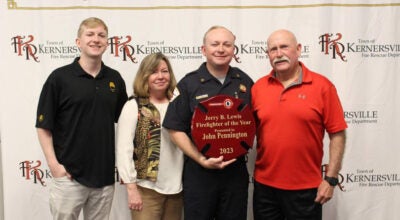Clemmons shifts on how to use American Rescue Plan funds
Published 11:16 am Tuesday, March 29, 2022
|
Getting your Trinity Audio player ready...
|
By Jim Buice
For the Clemmons Courier
Upon receiving word last spring that Clemmons would receive $6.6 million in federal relief funding through the American Rescue Plan as a result of the COVID-19 pandemic, plans were quickly put into place to use the money to address the growing stormwater problem.
However, with a time limit to use the funds and a continuing problem with supply chain issues, the village has now shifted how to deploy the nest egg, according to finance officer Ann Stroud, in a plan that received unanimous approval from the council to amend the grant ordinance in Monday night’s meeting.
“When we initially set up the American Rescue Plan Ordinance, we did 100% of our funds into stormwater infrastructure policies,” Stroud said. “We’ve had a couple of issues with that. No. 1, there is supply issues. There is a time limit on this money to spend. So we don’t want to be in a position that we have to give some of it back.
“So basically we have an estimate on our top three (stormwater) projects, which is Springside, Tanglebrook and Doublegate. Then we also put some of the stormwater drainage and repairs, which is our smaller projects, they can be anywhere from $1,500 to $7,500, and we can get a lot of those out of the way. In fact, get our list up to date pretty much. One advantage to that is their lower cost, so you don’t have all the federal hoops to go through as far as procurement and everything.”
Then, as a suggestion from the School of Government, Stroud said she learned there is a lot less paperwork for salaries and benefits than almost anything in the ARPA, so she explored spending in this area to free up spending on other projects.
“Basically, I did a period from Jan. 1, 2022, to June 30, 2023, of salaries and benefits,” Stroud said. “What this does is free up the money from the salaries and benefits that you can spend on some kind of capital venture or other things since you’re not having to spend on salaries.
“The School of Government kind of kiddingly calls it money laundering. You’re still going to be doing some kind of capital project with it. We’re also still doing a lot of infrastructure projects. We just don’t want to, because we can’t get supplies, not to be able to spend the money.”
Council member Bradley Taylor, who agreed to work with Stroud in January in a new process for the American Rescue Plan approval authorization, said he asked her a question about the provision of government services as it related to the different types of applicabilities.
“She provided a great answer in response that the way she structured it, it will allow us the most flexibility in using this for stormwater, salaries, benefits and other things.” Taylor said. “So I did ask a question just to make sure we were doing the right thing.”
Stroud said, “I will say I didn’t get all this information on my own. The School of Government has earned their money this year is all I can say.”
In addition, the council unanimously approved two budget amendments, 22-S-2 and 22-G-10, for cost-of-living adjustments.
“For employment retention, the manager did request that we do a 5% cost of living increase for employees, and this is what these two amendments are for,” Stroud said.
Also, the council approved four “template” ARPA policies: uniform guidance eligible use policy, uniform guidance cost principal policy, records retention policy amendment and non-discrimination policy.
In another agenda item, the council approved Resolution 2022-R-5 directing the clerk to investigate a petition received under NCGS 160-A-31 – Voluntary Annexation request of ALTA (Harper Acres) for Forsyth County properties of 12.31 acres and 14.45 acres owned by Jasper L. Harper Sr. and Jasper L. Harper Jr.
“This is the property that connects at Waterford off Lismore (Street) that we’ve had a little bit of discussion about,” said Village Manager Mike Gunnell.
Some families in the Waterford neighborhood have expressed concern about the potential development and the impact on the existing infrastructure and environment.
Lisa Shortt, village clerk/personnel officer, said the next steps in the process include her investigation and issuing a certificate of sufficiency if the vested rights are met. That will be followed by the matter going to the Planning Board for the rezoning request hearing in April. Then in the last meeting in April, the council will call for the public hearing for the rezoning request and the annexation. Then all the hearings for that will be May 9.
In other highlights from Monday night’s meeting, the council:
• Approved a 50/50 cost-share agreement for 3990 Woodhaven Court with the problem being public right-of-way drainage piped through the front and side of the property — and the water creating drainage issues near the property owner’s foundation and the neighboring property’s garage. The low bid for the project of $8,110 was submitted by Fleming Land Management, so the homeowner and the village would be responsible for $4,055 each.
• Approved amending multiple sections in Chapter A Definition Ordinance, Chapter B Zoning Ordinance, Chapter C Environmental Ordinance and Chapter D Subdivision Ordinance of the Unified Development Ordinances per changes to N.C. General Statutes (Zoning Docket C-UDO-86).
• Tabled a decision on Ordinance 2022-03 to amend portions of the Code of Ordinances to decriminalize certain violations until the April 11 meeting.
• Moved a discussion on considering a quote from CodeWright of $14,300 to do an 18-week assessment on the town’s UDO until the next meeting.
• Heard from council member Mary Cameron that the Friends of the Clemmons Library had a very successful sale last Thursday through Saturday with all the proceeds going to extra programs for the library in Clemmons.



